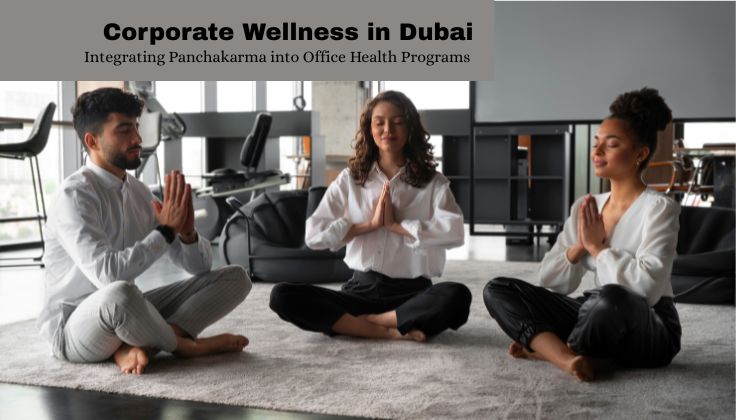


Dubai's busy business world iss changing in a lot of ways, where people are running behind busy schedules while trying to achieve a work-life balance. Instead of just offering typical gym memberships and occasional yoga classes, more forward-thinking companies are adopting a new approach to employee health. They are using traditional healing knowledge, adapted to meet modern workplace needs. Panchakarma treatment in Dubai is a comprehensive detox and renewal method from Ayurveda, and it is now leading this trend. It is being integrated into corporate wellness programs across the United Arab Emirates.
This is the ideal moment for this fusion. Statistics as per the recent studies reveal that 40% of Dubai workers find their jobs extremely stressful, which can negatively affect their health, leading to anxiety, sleep issues, and high blood pressure. The UAE corporate wellness industry is expected to grow at a CAGR of 4.98%, reaching $229.883 million by 2030. As a result, companies are actively seeking more comprehensive and efficient solutions that deliver measurable results rather than superficial benefits.
The treatment of Panchakarma provides a methodical purifying procedure intended to eradicate ingrained poisons, restore doshic equilibrium (Vata, Pitta, and Kapha), and foster overall well-being in contrast to short-term modern wellness strategies. Literally meaning "five actions," the word refers to its main methods of purification: Raktamokshana (bloodletting, which is rarely used nowadays), Basti (enema), Virechana (purgation), Nasya (nasal administration), and Vamana (therapeutic emesis).
Panchakarma's focus on personalized care makes it highly suitable for Dubai's business environment. Ayurheritage, a well-known Ayurvedic hospital in Dubai, states, "Panchakarma is most effective when tailored to an individual. Your unique doshic composition influences everything, including digestion, emotional tendencies, and physical form. This personalization meets the growing demand for customized wellness plans in the workplace."
Forward-thinking businesses in Dubai carry out Panchakarma in a step-by-step manner. Thoroughly knowing Dubai's unique labor mix is crucial for successful implementation of Panchakarma. Programs must consider the diverse needs and preferences of employees from different age groups, countries, and cultural backgrounds. Younger workers, especially Gen Z and millennials, are more open to holistic methods.
Businesses see changes in company culture that go beyond the metrics:
Team unity improved through shared wellness experiences.
Creativity and problem-solving skills are enhanced.
The team can better recover from stressful situations.
Employee retention and loyalty increase.
In the growing $2 trillion global wellness market, Panchakarma seamlessly fits into corporate wellness trends. According to McKinsey's research, 84% of US consumers and 94% of Chinese consumers prioritize wellbeing or consider it a key goal. This shows that younger generations are rethinking wellness in new ways.
A great support from stakeholders is the first step toward a successful integration. Wellness advocates recommend starting with pilot programs that target specific departments or volunteer groups, rather than launching full-scale initiatives immediately. Demonstrating measurable results from these initial efforts builds momentum for broader adoption.
Working with trained Ayurvedic specialists is crucial for the program's success. Panchakarma special packages are offered by experts, like those offered by Ayurheritage, which can assist corporate employees in a thorough understanding of Panchakarma procedures, preparatory techniques, and post-therapy care while also providing the care they need. Dubai's regulatory system maintains high standards. Establishments like Ayurheritage operate as DHA-licensed clinics, staffed with skilled medical professionals trained in Kerala.
Panchakarma's broader strategic value diminishes if it is viewed solely as a detox treatment. When used properly, these ancient techniques become powerful tools for:
Unique wellness products give businesses a competitive advantage in Dubai's intense job market. Over half of Gen Z and millennial employees rate wellness programs as 'important' or 'extremely important.' Nearly 90% of workers consider benefits packages when evaluating companies.
The UAE has some of the highest healthcare spending worldwide, so taking preventive steps can save a lot of money. Companies that support comprehensive wellness programs see notable reductions in absenteeism and insurance claims.
Panchakarma supports mental clarity and emotional strength, essential resources in knowledge economies. It does this by targeting the root causes of stress and exhaustion, rather than just their symptoms.
The use of ancient healing techniques like Panchakarma is more than just a wellness trend; it reflects a broader shift in workplace health as Dubai grows into a major global business hub. Forward-thinking companies view employee wellbeing as crucial to their success, not just an added benefit.
The upcoming Global Wellness Summit in Dubai (November 18–21, 2025), themed "Longevity Through a Wellness Lens," aims to promote this trend by gathering leading experts and innovative ideas to shape the future of wellness. This focus on long-term health aligns perfectly with Panchakarma's restorative and preventative approaches.
The timing is perfect for Dubai businesses considering traditional methods. Thanks to well-established training programs that certify Panchakarma technicians, growing research supporting traditional practices, and increased employee awareness of holistic health, now is the best time to incorporate Ayurveda's wisdom into the modern workplace.
Companies that truly embed wellbeing into their organizational culture, where traditional knowledge and modern innovation combine among the employees, will succeed in Dubai's next era of business leadership. These are the businesses that will build healthier, more resilient, and more human-centered workplaces, unlike those that only offer wellness programs.